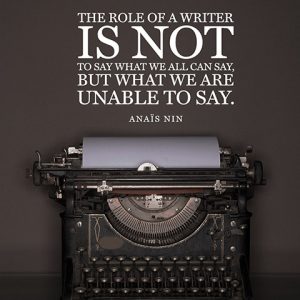 “All writers are liars. They twist events to suit themselves. They make use of their own tragedies to make a better story. They are terrible people . . .”
“All writers are liars. They twist events to suit themselves. They make use of their own tragedies to make a better story. They are terrible people . . .”
This quote by British writer Nina Bawden (1925-2012) in many ways speaks to the heart of what writers do: tell stories from their lives. To a writer everyone and everything is used as fuel to put words on paper.
This is a challenge for the nonfiction writer who understands that objective facts are both their most valuable commodity and, ironically, the Sword of Damocles that continually hangs over their heads. While fiction writers have the luxury of dressing real-life figures in a variety of faces to disguise anyone who might object to how they are portrayed, in most cases the nonfiction writer must trot them out bare and open like Lady Godiva for the entire world to see.
Despite protections under the law, particularly in the field of journalism and investigative reporting writers can still be sued in court. In these situations, juries become the arbiters of just what constitutes the truth.
To cross that tightrope, two essential questions should be asked. First, whether nonfiction writers should change names and enough information to disguise identity. Second, where is the dividing line between fact and fiction? When have facts been altered to the point that objective truth has now crossed the line into fiction and brings the writer’s credibility into question?
A possible solution of asking the individual(s) being written about for their permission to be included in stories has been fronted, but this can lead to the same problem if the person in question says no. Does the writer simply stop writing every time an individual in their story refuses to grant their permission to be included? Does the writer simply omit them? If the person is essential to the story, what then? In the end, the writer is confronted with the same potential dilemma they began with initially.
A compass for the nonfiction writer in situations like this it is to remember the definition of the word libel: “a published false statement that is damaging to a person’s reputation.”
What can the writer prove through objective facts? The word libel reminds the writer to constantly keep in mind where the line between truth and opinion lies; to remember what separates conjecture, supposition, and simply the need to embellish from the verifiable facts that are arguably any nonfiction writer’s true worth.
Will this protect a nonfiction writer from being dragged into litigation? No, nothing can; legal recourse is one of the great freedoms of any democracy. However, it is an incredibly powerful defense which very often successfully counters this type of legal action. Objective facts—and not opinion or dramatic embellishment—is the bedrock from which the strongest stories and reputations are carved out of during a career.
Like every other choice a writer makes the moment they put words to paper, this decision is their most valuable quality when it comes to their responsibility as a creator to defend what they have written.
Carlos Alverio, Assistant Editor

